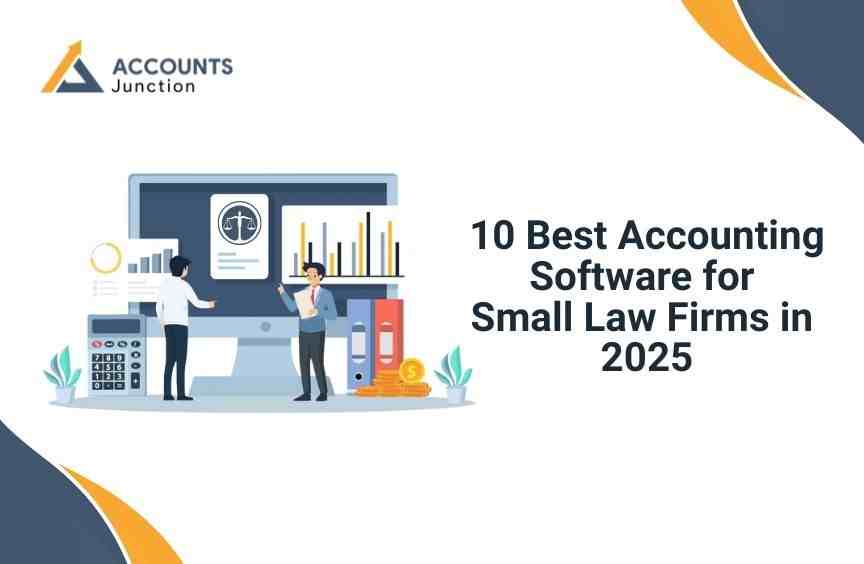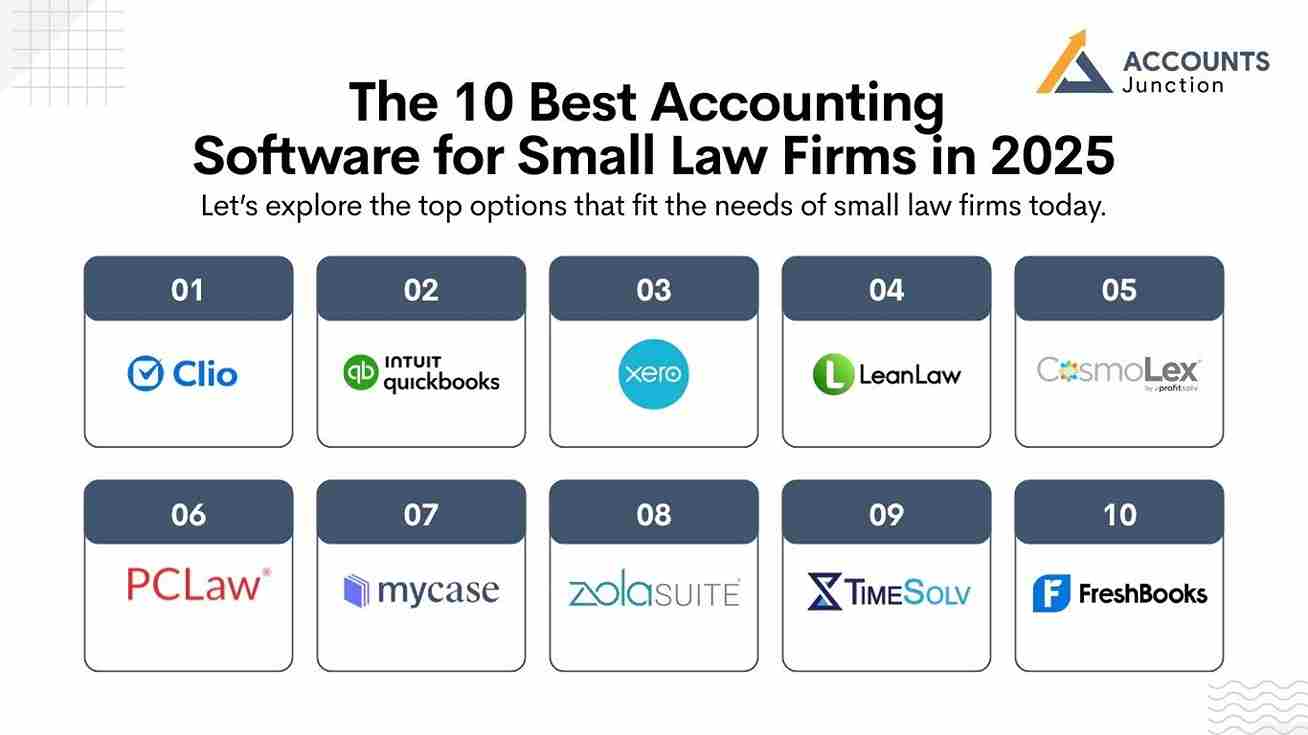
10 Best Accounting Software for Small Law Firms in 2025
Accounting plays a key role in the success of law firms. Small law firms must track client funds, manage billing, and follow trust rules with care. Doing these tasks by hand can take time and lead to errors. The best accounting software for small law firms makes work simple, saves hours, and keeps records accurate. It helps firms manage trust accounts, create clear reports, and stay compliant with legal and tax laws. In 2025, many tools will be built for legal use with strong features for billing and reporting. This guide lists the 10 best accounting software for small law firms in 2025 to help you choose the best system for smooth and secure financial control.
Why Accounting Software Matters for Small Law Firms
-
Simplifies Daily Financial Tasks
Small law firms often have small teams. Handling bills, client invoices, and trust funds by hand takes time. Good accounting software can do these jobs fast and with ease. It lets lawyers spend more time on clients and less on numbers.
-
Improves Accuracy and Compliance
Errors in billing or trust accounts can cause big trouble. The best accounting software for small law firms keeps records clear, reports clean, and follows all rules like IOLTA laws. This builds trust and keeps your firm safe.
-
Enhances Cash Flow and Growth
By tracking money in and out, small law firms can plan budgets with more control. Accounting software shows where income comes from and where it goes. This helps firms spend smart and grow with ease.
How to Choose the Right Accounting Software for a Small Law Firm
Before you pick a tool, know what makes the best accounting software for small law firms worth it. The right one saves time, avoids errors, and keeps your books clear.
1. Ease of Use
- Lawyers are busy and don’t have time to learn hard tools. Pick software that is quick to set up and simple to use. Clear menus, easy reports, and a clean dashboard make a big difference. The goal is to spend less time on screens and more time with clients.
2. Legal Features
- Not all tools work well for law firms. Choose one that has trust accounting, time tracking, and matter-based billing. These tools help your firm stay in line with rules and manage each client fund with care.
3. Cloud Access and Data Safety
- Many law firms now work on the move. Cloud-based tools let you view reports and handle bills from any place or device. Pick one that keeps data safe with encryption and strong login tools so client info stays private.
4. Integration
- Good software should connect with tools like Clio, QuickBooks, or Xero. This link helps share data fast and avoids double entry. It also keeps billing, time, and reports in sync — saving both time and effort.
The 10 Best Accounting Software for Small Law Firms in 2025
Let’s explore the top options that fit the needs of small law firms today.
1. Clio Manage + Clio Accounting
Clio remains one of the best accounting software for small law firms in 2025. It’s a complete solution made for legal professionals.
Key Features
- Matter-based billing and client tracking
- Trust accounting and compliance reports
- Integration with QuickBooks and Xero
- Mobile app for billing on the go
Clio combines practice management with accounting tools. This makes it perfect for law firms that want an all-in-one solution.
2. QuickBooks Online
QuickBooks has been a trusted name for years, and it’s still one of the best accounting software for small law firms this year.
Key Features
- Time tracking and billing
- Custom invoice templates
- Expense and tax tracking
- Integration with Clio and LeanLaw
QuickBooks Online is easy to use and fits any business size. For law firms, its ability to manage client trust accounts and generate reports is a big plus.
3. Xero
Xero is another strong player in the accounting world. It’s popular among small law firms for its clean interface and automation.
Key Features
- Smart reconciliation
- Trust account management
- Integration with practice management tools
- Strong reporting tools
Xero’s cloud access and affordability make it a top choice for law firms that want efficiency without big costs.
4. LeanLaw
LeanLaw was built specifically for law firms, which makes it one of the best accounting software for small law firms in 2025.
Key Features
- Time and expense tracking
- Trust accounting compliance
- Matter-based billing
- Direct integration with QuickBooks
It’s simple and designed with lawyers in mind. LeanLaw focuses on making legal billing and trust accounting easier than ever.
5. CosmoLex
CosmoLex combines legal practice management with accounting tools. It’s one of the most complete platforms on the market.
Key Features
- Built-in legal accounting
- Trust and operating account management
- Time tracking and billing
- Cloud-based access
Unlike many tools, CosmoLex doesn’t need third-party accounting software. It handles everything on one platform.
6. PCLaw
PCLaw is a long-standing name in legal accounting. Many law firms still rely on it for its deep legal features.
Key Features
- Time, billing, and accounting in one
- Trust fund management
- Financial dashboards and reports
- Desktop and cloud options
It’s a full-featured system built for law firms. Though a bit complex for very small firms, it’s ideal for those ready to grow.
7. MyCase
MyCase is another complete practice management and accounting platform.
Key Features
- Billing, invoicing, and payment tracking
- Automated reminders
- Time tracking tools
- Integration with QuickBooks
MyCase’s user-friendly design and automation save small law firms a lot of time on admin work.
8. Zola Suite
Zola Suite offers advanced features for both accounting and legal practice management.
Key Features
- Unified billing and accounting
- Bank reconciliation tools
- Built-in time tracking
- Matter-based financial reporting
Zola Suite’s all-in-one design helps firms avoid using multiple apps, making it a smooth choice for busy teams.
9. TimeSolv
TimeSolv is great for small and mid-sized law firms that focus on billing and reporting.
Key Features
- Time tracking with detailed reports
- Expense management
- Trust accounting support
- Integration with QuickBooks and Xero
TimeSolv helps firms keep billing accurate while maintaining compliance with trust rules.
10. FreshBooks
FreshBooks is known for its ease of use, and it’s gaining popularity among small law firms in 2025.
Key Features
- Time and expense tracking
- Simple invoicing and online payments
- Mobile app access
- Integration with practice management tools
FreshBooks is perfect for solo practitioners or small teams that need simplicity and speed.

Comparison Table: Top 10 Software at a Glance
|
Software |
Legal-Specific |
Cloud-Based |
Trust Accounting |
Integration with QuickBooks |
Best For |
|
Clio |
Yes |
Yes |
Yes |
Yes |
All-in-one legal accounting |
|
QuickBooks |
No (General) |
Yes |
Yes (with add-ons) |
Yes |
General use and flexibility |
|
Xero |
No (General) |
Yes |
Yes (via integration) |
Yes |
Simplicity and automation |
|
LeanLaw |
Yes |
Yes |
Yes |
Yes |
Legal billing focus |
|
CosmoLex |
Yes |
Yes |
Yes |
No need |
Complete built-in system |
|
PCLaw |
Yes |
Yes/No |
Yes |
Limited |
Growing firms |
|
MyCase |
Yes |
Yes |
Yes |
Yes |
Ease of use |
|
Zola Suite |
Yes |
Yes |
Yes |
No |
Full practice management |
|
TimeSolv |
Yes |
Yes |
Yes |
Yes |
Billing accuracy |
|
FreshBooks |
No (General) |
Yes |
Yes (via integrations) |
Yes |
Small teams or solo lawyers |
Benefits of Using the Best Accounting Software for Small Law Firms
1. Saves Time and Reduces Errors
- Automating billing and accounting reduces manual work. The software keeps data clean and accurate.
2. Ensures Legal Compliance
- Tools with built-in trust accounting help firms follow state and IOLTA laws.
3. Improves Client Satisfaction
- Accurate bills and fast payments create trust and improve client relationships.
4. Boosts Profit and Planning
- Lawyers can see where profits come from and make better financial choices.
5. Enhances Remote Access
- With cloud-based tools, lawyers can manage accounts from any device securely.
Tips for Implementing Accounting Software in a Small Law Firm
1. Start with a Free Trial
- Always try a free trial before choosing. This lets your team test features before paying.
2. Train Your Team
- Even the best accounting software for law firms works best when your team knows how to use it. Offer short training or demos so everyone feels confident and ready.
3. Migrate Data Carefully
- Move old records with care. Backup data before migration to prevent errors.
4. Customize Reports
- Tailor reports to show the metrics your firm needs most, like client profitability or case costs.
5. Keep Software Updated
- Always update your software to stay secure and benefit from the latest features.
The right accounting software helps small law firms manage billing, trust funds, and reports with ease. Tools like Clio, LeanLaw, CosmoLex, and QuickBooks save time, reduce mistakes, and keep records clear.
At Accounts Junction, we use these tools to offer simple and reliable accounting and bookkeeping for small law firms. Our certified experts take care of daily books, trust fund records, and reports with skill and care, making sure all data stays correct and compliant.
We keep your firm’s accounts in order all year round. Partner with us for clear books, expert service, and smooth control of your firm’s finances.
FAQs
1. What is the best accounting software for small law firms in 2025?
- Top tools are Clio, LeanLaw, CosmoLex, and QuickBooks. They track bills, trust money, and reports with ease.
2. Can small firms use QuickBooks?
- Yes. QuickBooks helps track bills, trust funds, and taxes for small law firms.
3. Is Xero good for law firms?
- Yes. Xero is simple, cloud-based, and links with Clio and LeanLaw.
4. What is trust accounting?
- It means tracking the client's money that the firm holds. Law tools keep those funds safe and clear.
5. Can one tool manage both cases and accounts?
- Yes. Clio and CosmoLex both do case work and accounting in one app.
6. Is cloud accounting safe for law firms?
- Yes. Cloud tools use safe logins, backups, and data locks to guard client info.
7. How much does law firm accounting software cost?
- Most tools cost $20–$80 per user each month. Some have free trials.
8. Which tools link with Clio?
- QuickBooks and Xero sync well with Clio for bills, time, and pay data.
9. Do I need training to use these tools?
- Not much. Most tools are easy to learn and come with short guides or videos.
10. Why is LeanLaw a top pick?
- LeanLaw is built for lawyers. It tracks time, trust funds, and client bills with ease.
11. Is CosmoLex a full legal tool?
- Yes. CosmoLex has billing, time, and trust tools — no extra apps needed.
12. Can these tools track tax data?
- Yes. QuickBooks and Xero track tax and make reports for easy filing.
13. What are the main perks of law accounting tools?
- They save time, cut errors, keep trust funds safe, and follow rules.
14. Can software help build client trust?
- Yes. Clear bills and on-time reports build trust with clients.
15. How do I pick the best law firm accounting tool?
- Pick one that’s easy, safe, cloud-based, and fair in price. Try a free test first.
